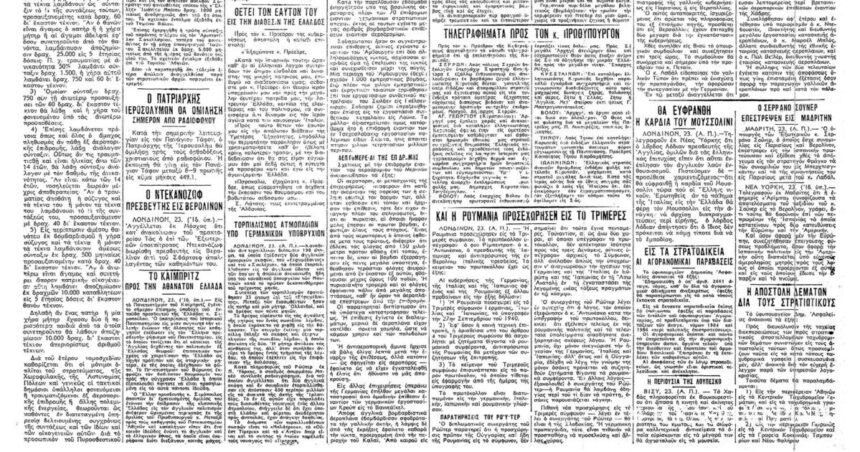In the 1930s, Romania was experiencing a major political crisis. King Charles II emerged as a dominant personality in the political life of the country. Political parties were gradually marginalized and Romania went through a period of bankruptcy of parliamentarism. Only in the period January 1934-December 1937 was political stability achieved in time, when the liberal George Tatarescu took over the government.
During the interwar period, phenomena of anti-Semitism were very common. One organization that had adopted anti-Semitic positions was the Iron Guard led by Cornelios Zeleas Kondreanos. Blasting the corrupt political system and promoting the values of sacrifice and giving, Kondreanu attracted to his organization farmers, workers, intellectuals, civil servants and young people, who did not participate in the province of power. The organization cultivated a religious mysticism, having Archangel Michael as its patron.
Charles II did not share the beliefs of the members of the “Legion of Michael the Archangel”, as the Iron Guard was often called, but he allowed its operation. In 1938 he imposed a royal dictatorship on the country. As a justification for the imposition of the dictatorship, Charles cited the abnormal internal political situation and the increase in external risks. Fearing the strengthening of the Iron Guard, he made the decision to disband it. In April 1938, Condreanu was arrested and sentenced to ten years in prison after the organization’s congratulatory statement to Hitler for the annexation of Austria. In November of the same year, Condreanu and other members of the organization were executed. It was officially announced that they were shot while trying to escape. Horia Sima then took over the reins.
After the defeat of France by the Axis powers, Romania lost its great ally. The Romanian leadership then turned to Germany, hoping that in this way it would secure the country’s territorial integrity. He even released members of the Iron Guard in order to appease Hitler. But her hopes were dashed. On June 28, 1940, the Soviet Union annexed Bessarabia and Northern Bukovina, on August 30, Hungary annexed Northern Transylvania, and on September 7, Bulgaria annexed Southern Dobrudja and Silistria. The mutilation of interwar Greater Romania was complete.
Popular discontent against Charles II and his mistress and later wife Magda Lupescu peaked in early September. On the 4th of the month, he assigned the prime ministership to Ion Antonescu and a little later he left the country. Antonescu was a general who had fallen out of favor in previous years because of his disagreements with Charles. He exuded nationalist ideas, which he did not hide. According to him, Romania should have come into conflict with the Soviet Union, as he believed that in this way it would recapture Bessarabia. Convinced that an alliance with Germany served Romanian interests, on 23 November 1940 Antonescu signed Romania’s act of accession to the Tripartite Pact of Germany, Italy and Japan, which the three countries had entered into the previous September. Hungary and Slovakia did the same.
Following the developments in the wider region, “Kathimerini” reported in the paper of November 24, 1940: “Romania joined the Tripartite Pact. The protocol was signed by von Ribbentrop, Mr. Antonesco, the Japanese ambassador and representative of the Italian embassy in Berlin.” Quoting information from “Reuters”, the newspaper noted that “the speech, which Mr. Antonescu made during the signing of the protocol, shows that the last vestiges of any independence of thought and speech have completely disappeared from Romanian politics. Romania, not only recognized the leadership of Germany, Italy and Japan, but like Hungary, accepted to speak its opinion only when issues affecting Romanian interests are to be discussed”.
During the first period of his prime ministership, Antonescu cooperated with the Iron Guard. The organization, taking advantage of this situation, unleashed a series of violent actions against its political opponents. A victim of the Legionnaires’ atrocities was the historian and politician Nikolae Iorga. In January 1941, the Romanian army, with the help of the Germans, intervened forcefully, definitively disbanding the organization, which had aspirations of seizing power in the country.
Column editor: Myrto Katsigera, Vassilis Minakakis, Antigoni-Despina Poimenidou, Athanasios Syroplakis




